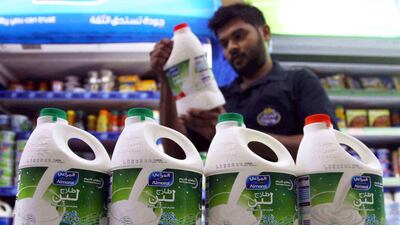Dairy conglomerate Almarai, the Middle East’s leading food beverage manufacturer and distributor, has been given an issuer rating of Baa3 with a stable outlook, Moody’s Investor Service announced on Thursday.
A bond is considered investment grade if its credit rating is Baa3 or higher.
“Almarai's Baa3 rating reflects its leading market positions and high Ebitda (earnings before interest, tax, depreciation and amortisation) margin thanks to a vertically integrated supply chain, which partially offsets its concentration risk on dairy products,” said Lahlou Meksaoui, a Moody's lead analyst.
Moody’s said it assigned the first-time rating to the private sector company, based in Riyadh, due to its strong market positions in products such as milk, cheese, butter and bakery; its well-recognised brands; its high margins, manufacturing efficiencies and strict control of operating expenses; good liquidity and a prudent financial policy.
Almarai’s issuer rating was constrained by several factors, including its geographic concentration, especially with respect to dairy farms. Its concentration of profit in the dairy products segment accounted for about 50 per cent as of the end of the year. There was also slowing revenue growth and pressures on cost and pricing.
In January, the company reported a 28 per cent drop in fourth-quarter net profit due to an increase in labour and energy costs and a couple of one-time write-offs of assets. Net profit after zakat and taxes fell to 369.6 million riyals (Dh362m) from 512.9m riyals reported a year earlier, the company said in a statement to the Saudi stock exchange, where its shares are listed.
The rationale for the stable outlook “reflects our expectation that Almarai's credit profile will be able to withstand the current adverse market conditions without breaching the current rating category guidance”, Moody’s said.
“In response to the difficult operating environment resulting in limited organic growth, we expect opportunistic acquisitions to enter categories or countries,” it added.
The company's liquidity is also good, according to Moody’s. It had 1.183bn riyals in cash and cash equivalents as of the end of the year, and 3.050bn riyals fully available under committed revolving credit facilities. This is sufficient to cover debt maturities of 3.350bn riyals in the next 18 months.
Almarai’s adjusted debt to EBITDA ratio, a measure of the ability of a company to pay off its debts, is 3.1x as of December 31, 2018. The Baa3 rating could be upgraded if Almarai improves its scale and product portfolio diversity, as well as reduces its adjusted debt to Ebitda ratio to 2.5 times, Moody’s said. It must also maintain strong margins and credit quality, robust liquidity and free cash flow generation, and a prudent dividend policy.
Almarai could be downgraded if the adjusted debt to Ebitda ratio remains above 3.5 times or adjusted retained cash flow to debt ratio remains below 20 per cent for an extended period. Other factors that could lead to a downgrade include a deterioration in profitability or liquidity, increased payouts to shareholders and large debt-financed acquisitions.
Founded in 1977, Almarai is now the world’s largest vertically integrated dairy company. The group is active in five sectors across the Middle East and North Africa region: dairy (liquid and foods), juice, bakery, poultry and infant nutrition. Its major brands include Almarai, L’Usine, 7 Days and Alyoum.
Almarai reported sales of 13.7bn riyals and operating profit of 2.5bn riyals in 2018. The company's main shareholders are Savola Group, Saudi Prince Sultan bin Mohammed bin Saud Al Kabeer and Public Investment Fund, the kingdom's sovereign wealth fund.


